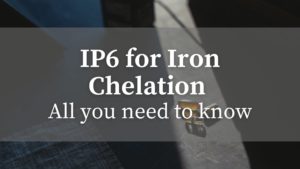I have always wondered if there are any natural supplements to lower iron levels. If you are here, it means you are wondering the same thing, right?
So, are there any supplements that may help lower ferritin and iron levels?
The answer is YES!
These supplements are not a replacement for medical treatments like Desferal or phlebotomy. But they will definitely support your chelation regimen and help in improving your overall health.
So, let’s get started, here are the 6 supplements that have proven to be effective iron chelators:
Turmeric (Curcumin)
Turmeric is a commonly used herb but not many people know its benefits for people with iron overload and inflammation.
The active ingredient in turmeric called curcumin is a potent antioxidant, anti-inflammatory, and iron-chelating agent.
I’ve been using turmeric curcumin as a supplement for over two years and have found it to be quite effective and safe as well.
It has helped in reducing joint pains and I’ve seen changes in my ferritin levels as well. Read this article I wrote to find out more about how turmeric can reduce your iron levels.
The product I have been using is called Nature’s Nutrition Turmeric Curcumin with BioPerine.
Based on my experience and studies I have seen, turmeric is the most promising supplement to lower iron levels.
Quercetin
Quercetin is a flavonoid found in many plants and foods, such as onions, berries, grapes, red wine, green tea, black tea, and apples.
Studies have shown that quercetin is a potent iron chelator with a strong ability to bind iron. There has even been a study on thalassemia major patients with high iron levels which found that the combination of Desferal and Quercetin was more effective at reducing ferritin and inflammation levels than just Desferal alone.
So, it is quite safe to say that quercetin is an excellent iron chelator, and you should definitely add a quercetin supplement to your diet if you are looking to reduce your iron levels.
I recommend using Jarrow Formulas Quercetin 500 mg.
Milk Thistle
Milk thistle, also known as Mary’s Thistle or Holy Thistle, is a anti-oxidant with proven hepatoprotective properties. It is great for the liver, immune system, kidneys and is even helpful in treating diabetes symptoms.
But does milk thistle really reduce iron levels?
Multiple studies have found milk thistle to be an effective iron chelator with the ability to chelate stored iron and reduce iron absorption from the gut as well.
You can start milk thistle any time of the day but try to start at a low dose and build up slowly once your body starts to get used to it. If you feel any side effects, stop taking it and talk to a doctor immediately.
I take it at night before sleeping but some people take it with food or even on an empty stomach. It’s considered quite safe so you can try it at multiple times and go with what works best for you.
The supplement I use is called Puritan’s Milk Thistle and Dandelion Extract.
Do read this article on wrote on milk thistle for iron chelation. It has all the information you might need.
Resveratrol
Resveratrol is a polyphenol found mostly in berries, red wine, and the skin of grapes.
Studies have shown that resveratrol is a potent iron chelator with free radical scavenging properties. Which makes it a good addition to any iron chelation regimen.
I am not taking resveratrol at the moment, but I’ve tried it before. Back then I did not know about its iron chelation properties.
I was using it to see if it can improve my hemoglobin and endurance. But I don’t think I noticed any significant changes during the time I took it.
I tried it for a couple of months so I can vouch for its safety as it did not cause any problems for me.
Based on research, I would recommend Puritan’s Pride Resveratrol 100 mg.
Like with any other supplement, it is best to start at a low dose and increase it slowly rather than starting off at a high dose.
IP6
IP6 (Inositol hexaphosphate) is a natural compound found in many plants, vegetables, and foods with high fiber content, such as cereals.
Its anti-oxidant properties have long been well-known, and IP6 has recently been subjected to many studies regarding its preventative role for cancer and its part in reducing the size of tumors and existing cancerous spreads.
On top of those major functions, it also helps our immune system, lowers cholesterol levels, and maintains proper kidney function.
IP6 has been recognized as a natural supplement to reduce iron, making it a great supplement for patients with iron overload.
The IP6 supplement I take is Nature’s Way Cell Forté IP-6 & Inositol so that is what I would recommend to you as well.
Read my article on IP6 for iron chelation to know more about the dosage and best time to take IP6.
Green Tea
Everyone knows that green tea is great for digestion and weight loss. But most people don’t know that green tea is a great source of antioxidants and naturally chelates iron from the body (Read this article I wrote on green tea for iron chelation).
It has free radical scavenging properties which reduce the damage caused by stored iron in organs like the liver and heart.
The only problem is that just a cup of green tea will not do enough to help reduce iron levels. It will help in reducing the absorption of iron from your gut though.
So, drink green tea immediately after a meal, especially if it’s a meal high in iron like beef or liver.
But if you want to chelate iron, you will need to take a high-quality Green Tea supplement.
I would recommend taking NOW Supplements, EGCg Green Tea Extract 400 mg.
There are many options available but try to stay away from ones that contain vitamin C as vitamin C helps in absorbing iron which is not good if you are trying to reduce iron levels.
References:
https://www.ncbi.nlm.nih.gov/pmc/articles/PMC4521784/
https://pubmed.ncbi.nlm.nih.gov/31519283/
https://www.ncbi.nlm.nih.gov/pmc/articles/PMC3308202/
This article contains affiliate links



